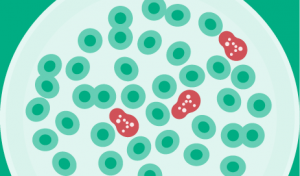 Can infections cause cancer? Many people don’t realise that infections can be associated with cancer, but around 16% are caused by viral, bacterial or parasitic infections.
Can infections cause cancer? Many people don’t realise that infections can be associated with cancer, but around 16% are caused by viral, bacterial or parasitic infections.
The infections most commonly associated with an increased cancer risk are the human papilloma virus (HPV), hepatitis B (HBV) and C (HCV), and the bacterium Helicobacter pylori (H pylori).
HPV is a common infection, but there are some high-risk types of the virus which can lead to several cancers, including cervical and anal. It’s spread through close skin-to-skin contact, usually during sexual activity. Using a barrier method of contraception reduces the risk.
Vaccination is also effective where available: girls in the UK (aged 12–13) and the US (11–12) are offered vaccination against the types of HPV that cause the majority of cervical cancers.
Infection with HBV or HCV can cause liver cancer. These can be passed on through blood and other bodily fluids, most commonly through sexual activity or sharing needles to inject drugs.
In most countries, young children are offered routine vaccination against HBV. The risk can also be reduced by practising safe sex and not sharing needles.
Infection with H pylori, a type of bacterium that grows in the inside layer of the human stomach, is very common worldwide, especially in low- and middle-income countries. Usually acquired during childhood, it is spread through contaminated food and water, and direct mouth-to-mouth contact.
It increases the risk of stomach cancer. It can also cause stomach ulcers. Infection with H pylori can be treated, so it’s important to talk to your doctor if you have stomach problems or ulcers.
Human immunodeficiency virus (HIV) is spread through blood and other bodily fluids, most commonly through sexual activity or sharing needles to inject drugs. People living with HIV are at an increased risk of some cancers, including Kaposi sarcoma, lymphoma, liver cancer and lung cancer.
Treatment for HIV is available, so anyone who thinks they are at risk should talk to their doctor about being tested. Support is offered by the Terrence Higgins Trust around HIV testing, living with HIV, and sexual health.
Sources